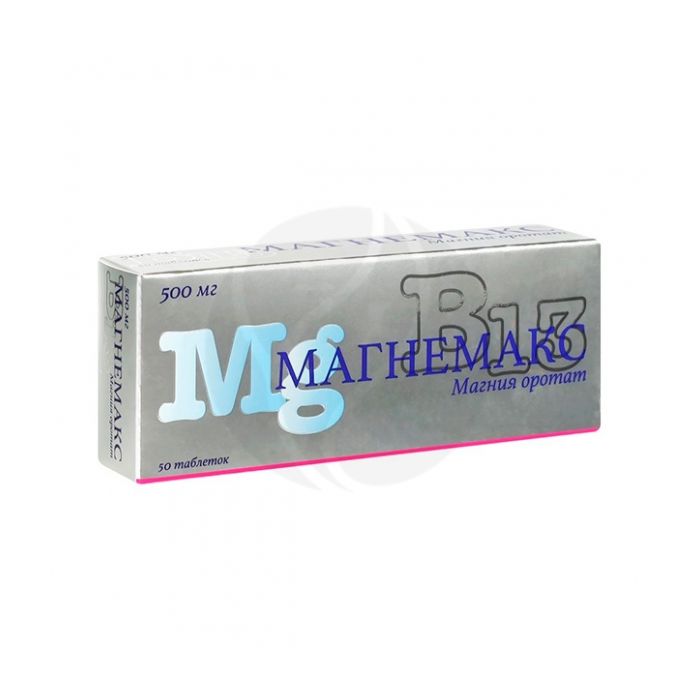Magnemax tablets 500mg, No. 50
Expiration Date: 05/2027
Russian Pharmacy name:
Магнемакс таблетки 500мг, №50
Identified magnesium deficiency, isolated or associated with other deficiency conditions, accompanied by symptoms such as:
increased irritability
minor sleep disturbances
gastrointestinal cramps
increased fatigue,
pain and muscle spasms,
tingling sensation in the muscles.
If after a month of treatment there is no improvement in these symptoms, continued treatment is impractical.
Inside, before meals, with a small amount of liquid.
Assign 2 tablets 3 times a day for 7 days, then 1 tablet 2-3 times daily.
The duration of the course of treatment is 4 weeks.
1 tablet contains :
active ingredient: magnesium orotate dihydrate 500 mg;
excipients: lactose monohydrate, corn starch, microcrystalline cellulose, povidone K-30, croscarmellose sodium, colloidal silicon dioxide (aerosil), sodium cyclamate, talc, magnesium stearate.
Hypersensitivity to the components of the drug,
urolithiasis disease,
impaired renal function,
predisposition to the formation of calcium-magnesium-ammonium-phosphate stones,
cirrhosis of the liver with ascites.
Children under the age of 18.
The drug contains lactose, so it should not be used in patients with lactose intolerance, lactase deficiency or glucose-galactose malabsorption.
Trade name
Magnemax
Grouping name
Magnesium orotate
Dosage form
Pills
Composition
1 tablet contains :
active substance: magnesium orotate dihydrate 500 mg;
excipients: lactose monohydrate, corn starch, microcrystalline cellulose, povidone K-30, croscarmellose sodium, colloidal silicon dioxide (aerosil), sodium cyclamate, talc, magnesium stearate.
Description
Round flat-cylindrical tablets of white or almost white color with beveled and scored.
Pharmacotherapeutic group
Magnesium preparation
ATX code : ј12——09
Pharmacological properties
Pharmacodynamics
Magnesium preparation. Magnesium is an essential trace element, it is involved in the implementation of more than 300 enzymatic reactions, regulation of cell permeability and neuromuscular excitability. It is necessary for the provision of many energy processes, it is involved in the metabolism of proteins, fats, carbohydrates and nucleic acids. Magnesium has a curariform effect on the endings of cholinergic neurons, with a decrease in acetylcholine release. Magnesium and calcium interact in part synergistically in the body: however, when competitively inhibiting calcium, magnesium can also affect binding sites as a 'physiological calcium antagonist'.
Pharmacokinetics
Approximately 35-40% of the dose taken is absorbed. Hypomagnesemia stimulates the absorption of magnesium ions. The presence of orotic acid salts helps to improve the absorption of magnesium.
Magnesium is excreted by the kidneys, excretion decreases with magnesium deficiency and increases with its excess.
Indications for use
Identified magnesium deficiency, isolated or associated with other deficiency conditions, accompanied by symptoms such as:
increased irritability
minor sleep disturbances
gastrointestinal cramps
increased fatigue,
pain and muscle spasms,
tingling sensation in the muscles.
If after a month of treatment there is no improvement in these symptoms, continued treatment is impractical.
Contraindications
Hypersensitivity to the components of the drug,
urolithiasis disease,
impaired renal function,
predisposition to the formation of calcium-magnesium-ammonium-phosphate stones,
cirrhosis of the liver with ascites.
Children under the age of 18.
The drug contains lactose, so it should not be used in patients with lactose intolerance, lactase deficiency or glucose-galactose malabsorption.
Application during pregnancy and during breastfeeding
It is possible to use it during pregnancy only on the recommendation of a doctor. Magnesium passes into breast milk. Avoid using the drug during breastfeeding.
The use of the drug during pregnancy and lactation is possible if the potential benefit to the mother outweighs the potential risk to the fetus and child.
Method of administration and dosage
Inside, before meals, with a small amount of liquid.
Assign 2 tablets 3 times a day for 7 days, then 1 tablet 2-3 times daily.
The duration of the course of treatment is 4 weeks.
Side effect
From the gastrointestinal tract: unstable stools and diarrhea, which usually go away on their own with a decrease in the dose of the drug.
From the immune system: allergic reactions.
Overdose
With normal kidney function, ingestion of magnesium does not cause toxic reactions. Magnesium poisoning can develop with kidney failure. Toxic effects mainly depend on the concentration of magnesium in the blood serum.
Symptoms: decreased blood pressure, nausea, vomiting, depression, slow reflexes, respiratory depression, coma, cardiac arrest, anuric syndrome.
Treatment: rehydration, forced diuresis. Renal failure requires hemodialysis or peritoneal dialysis.
Interaction with other medicinal products
With the simultaneous administration of magnesium-containing drugs with iron preparations, sodium fluoride and tetracyclines, the absorption of the latter may decrease. In addition, aminoquinolines, quinidine, penicillamine should not be administered simultaneously with magnesium preparations. Therefore, these medications should be taken at intervals of 2-3 hours. Oral contraceptives, diuretics, muscle relaxants, glucocorticosteroids, insulin, reduce the effect of the drug.
Magnesium should be used with caution if you are taking medications containing magnesium, such as antacids or laxatives, or potassium-sparing diuretics or medicines containing calcium. With simultaneous use with preparations containing aluminum, the absorption of aluminum in the body can be increased.
Magnesium should be used with caution when used concomitantly with digitalis preparations, since simultaneous use may interfere with the absorption of digitalis preparations.
Certain antibiotics (aminoglycosides), cisplatins, and cyclosporin A can lead to increased excretion of magnesium.
Certain diuretics (thiazides and furosemide), cetuximab and erlotinib, proton pump inhibitors (omeprozole and pantoprazole), foscarnet, pentamidine, rapamycin and amphotericin B can cause magnesium deficiency and thus reduce the effect of the drug.
special instructions
The drug contains lactose monohydrate, so its use is not recommended for patients with hereditary galactosemia, glucose and galactose malabsorption syndrome and lactase deficiency.
Influence on the ability to drive vehicles and mechanisms
The drug does not affect the ability to drive vehicles, mechanisms and engage in other activities that require increased concentration of attention and speed of psychomotor reactions.
Release form
500 mg tablets.
On 10 tablets in a blister strip packaging from a film of polyvinyl chloride and printed aluminum foil varnished.
1, 2, 3, 5, 10 blisters, together with instructions for use, are placed in a cardboard box.
Storage conditions
At a temperature not higher than 25 ? C.
Keep out of the reach of children.
Shelf life
3 years. Do not use after the expiration date.
Vacation conditions
Available without a prescription.

